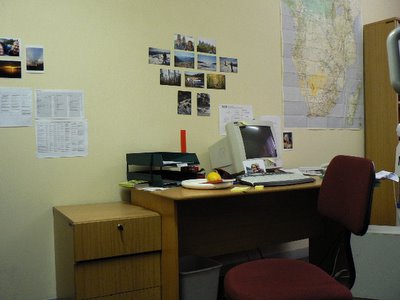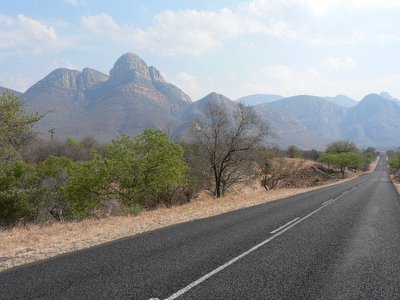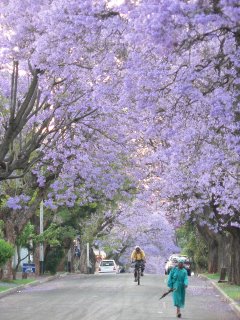
A few friends have pointed out that I have yet to make any reference to the first subject of my trip to South Africa - the internship at the World Conservation Union. Although the most memorable highlights of my time here so far have all been out of the office, the job has been rewarding in a number of ways. As last Friday marked the halfway mark in my 6 month term, and some small part of the week was spent reporting back to my host organization in Winnipeg (IISD - The International Institute for Sustainable Development) and meeting with my supervisor, Anthea, the time seems ripe for me to provide some comments.
The best part of the job is that I am in environment in which I am being exposed every day to issues of conservation and sustainable development. I have skirted around my interest in the environment for much of the past five years, since finishing the physical geography degree at UVic; thought I was moving away from it when I started the grad program in international affairs, but then found that I kept turning back to it whenever I needed to focus on an issue. It seems like a bitch of a field to get into, forever cast in the role of Cinderella: worthy object of care and attention to those with their eyes open to things of beauty; undervalued and ignored by most. Enlightened soul such that I am, however, I treasure the natural world and am happy to be in a place where I can start thinking a bit more seriously about how I might contribute to it over the course of my career.
The job itself is diverse. Meaning that some days I am busy and fulfilled, and others I am unclear about my role, frustrated and bored. As one would expect, as I become more embedded within the office, and more capable of independent work, the fulfilling days are outnumbering the boring ones. I have arrived at IUCN's South Africa Office at a time of transformation, and this has added a challenging dynamic to my learning environment. The founding director, who started the office eight years ago, left on Friday, along with a senior programme manager, leaving us without much leadership and a lot of uncertainty (the Country Office is given no role in filling the position for its own Director, which is handled by the regional office in Harare, and it's not expected that we will have a replacement until middle of next year). So up until recently there was an air of discontent, even malaise, around the office, which rubbed off on me from time to time. But this turbulence is settling down now, with Anthea assuming the acting role, and I am expecting that the next three months will bring more focus, support, substance (and hard work!) to my own role.
It's not easy to point to any one new skill that I have acquired, or even specific knowledge that I have gained at IUCN, but I feel that I have learned a fair bit so far. Put simply, I'm learning how to work! I am learning how to come in in the morning and organize my thoughts for the day; how to get through emails without taking all day; how to make priorities and recognize when something important drops into my inbox; how to take notes at meetings, and make them meaningful for others; how to integrate what I am learning into some larger picture, and to consider the relevance of new information; how to pick up the phone and communicate with strangers with precision and clarity; how to do the same face to face; and, as in school, how to read and write. I am also learning, slowly, how to motivate myself and stay focused when I lack guidance and am struggling to see the context in which I am working. I am learning how to be more disciplined and responsible for my own achievements and production. I am learning, as always, about my weaknesses (one of my great strengths, I like to think!), but perhaps more productively than I have done in the past; these lessons are helping me understand the kind of support I need in a job, and pinpointing the things I need to improve on in order to be successful in the areas that I wish to be.
I haven't been heavily involved in any single project, which has had its downsides (not working closely with anyone I can use as a role model; not given tasks that fit clearly into something bigger; not spurred on by deadlines), but its advantages too. Mainly, I have appreciated being exposed to the breadth of the organization, from projects to programming to politics.
I have researched trade issues around the natural products sector in Southern Africa, helped Anthea with a paper on the subject, written up a “Scope of Work” for a consultancy on the trade component of a new programme, and have since been corresponding like mad in order to get it filled. I knew nothing about trade issues in the natural products sector, or any other, two months ago.
I have interviewed candidates to facilitate a donor workshop on community-based eco-tourism in World Heritage Sites. I still don't know anything about facilitation or community-based eco-tourism, though I have been to Angkor Wat and Quebec City, which are both World Heritage Sites.
I have taken minutes at a two-day technical workshop that informed the drafting of a funding proposal to the UN's Global Environment Facility, and managed to summarize them even though, again, I knew nothing about the subject (ecosystem services and environmental restoration).
I have proof-read a couple hundred pages from reports on the local karst (cave) geology, which includes the famous Sterkfontein Caves, home of Mrs. Ples - the 2.5 million year old hominid who fell into a hole, thus helping us understand the evolution of our species.
I have visited a small community-based organization that produces oil from the local marula tree, which can be used to make things such as soap, as well as that well-known liqueur, Amarula (which I am told contains only miniscule amounts of marula - just enough to provide a great marketing line - but tastes pretty great all the same).
And I have been working on and off throughout the internship to help develop the office's four-year programme, which is informed by resolutions and recommendations established by the global organization, most recently last year in Bangkok. This has been a journey into “Results Based Management,” “Logical frameworks,” head-scratching, coffee-drinking, grumbling and groaning, and has provided a pretty unvarnished, behind-the-scenes view into the IUCN. Which reminds me that I should say a word about the acronym. As the most perceptive among you may have noticed, it does not stand for “The World Conservation Union.” Rather, it stands for “The International Union for the Conservation of Nature and Natural Resources.” Quite recently this mouthful was determined to be too much, though, especially when you factored in the language variations of some 130 member countries, and the name was changed. The problem, though, is that IUCN is a household name (providing at least one person in your house is interested or involved in conservation), whereas the World Conservation Union is not. So today we sit rather awkwardly with name and acronym that don't match, and employees who don't know how to answer the phone. All of which will be water under the bridge one day soon, I'm sure.
I haven't, actually, said all that much about what I do at work, but I hope that I have communicated some of its nature and what I have gained from it. It's been a good experience so far, working with good people on issues that need thinking about and investing in. Lisa's dad, David, asked me a little while ago if I've been making an impact down here, which seemed a bit mean - of course I haven't! It's not even clear to me what impact the organization itself has had in the last three months. It's a good question, though, and it probably doesn't get asked nearly enough. (Except by the private sector, naturally, which loves to use the absence of both question and answer to illuminate the vast superiority of market-based approaches and solutions to everything. But I'm not becoming an ideologue, I swear). Conservation, sustainable development, and all that don't present many easy answers. Most of them are complex, incomplete, expensive, easy to doubt, and easier to ignore. But rather hack away at it, I figure; at the very least it keeps the brain ticking over and the soul fulfilled, and with luck the IUCN and others WILL, in time, have an impact that we and our children can all be thankful for.
For now, I am just going to see if I can get my colleagues into the habit of recycling their coke cans.
Some photos here of the team buggy riding one Saturday afternoon, on the side of the highway outside Jo'burg - some funny South African thing I guess (
here).





